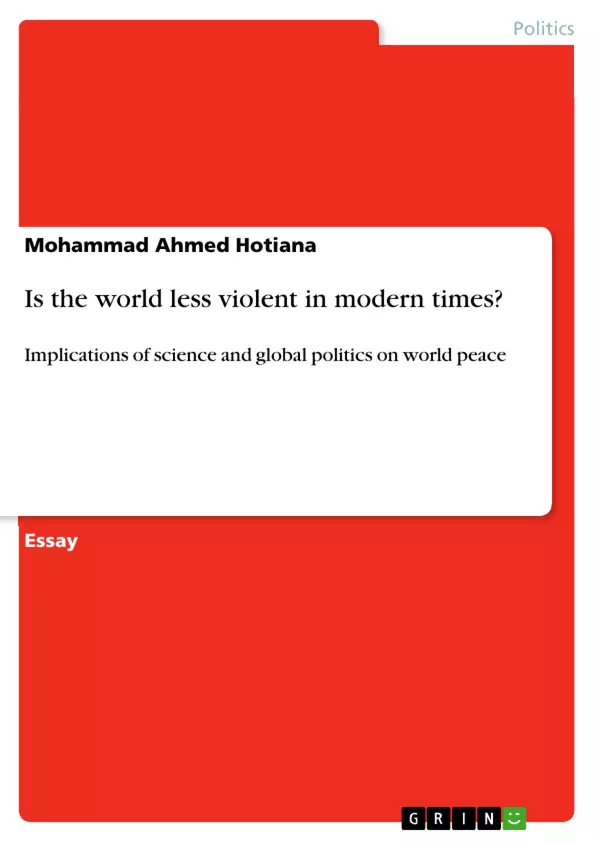Events such as great breakthroughs in science, changes in political infrastructures, spread of knowledge and education, creation of high-tech weaponry, religious terrorism, and war on terror have greatly affected the wider world. This has made everyone, from a layman to a military personnel and from a diplomat to a scientist, question if these changes in the world around us have contributed in making the world a less violent place or otherwise.
In this research paper, we shall try to discuss if the modern times are less violent or is it the other way around. To do so, we would be using some arguments by John Avery, as portrayed in his writing: Space age science and stone-age politics, in order to discuss how modern science and technology have produced evils that contribute to global violence. In addition, we would use his work to assess some factors in the world of today that neglect the hypothesis that the world of today is a less violent place.
Furthermore, we would rely on: The better angels of our nature by Steven Pinker to find arguments suggesting that violence has been in decline for a while now. In addition, we would try to examine his idea of the world being at the most peaceful stage in the history of the human race.
We would be using some statistical data and other resources in order to find answers to the following questions:
1. Does modern science play a role in peace making or does it work against it?
2. Do nationalism and the creation of states help in making the world less violent?
3. Does abolition of punishments like death penalty decrease violence?
4. What is the contribution of education and economics towards a world with less violence?
5. How effective is the role of international peace-making systems?
Inhaltsverzeichnis (Table of Contents)
- Does modern science play a role in peace making or does it work against it?
- Do nationalism and the creation of states help in making the world less violent?
- Does abolition of punishments like death penalty decrease violence?
- What is the contribution of education and economics towards a world with less violence?
- How effective is the role of international peace-making systems?
Zielsetzung und Themenschwerpunkte (Objectives and Key Themes)
This research paper examines the complex question of whether the world is less violent in modern times. It explores the impact of scientific advancements, political structures, and other factors on global peace. The paper aims to provide a comprehensive analysis of this topic, taking into account various perspectives and arguments.
- The role of modern science in promoting or hindering peace
- The impact of nationalism and state formation on global violence
- The relationship between punishment, including the death penalty, and violence
- The contribution of education and economic development to a less violent world
- The effectiveness of international peace-making systems
Zusammenfassung der Kapitel (Chapter Summaries)
The paper begins by examining the impact of modern science on global violence. It explores the argument that while science has brought about significant advancements in technology and quality of life, it has also provided the means for devastating weapons of mass destruction. The paper then delves into the debate surrounding nuclear weaponry, contrasting the views of those who see it as a deterrent to war and those who believe it poses a significant threat to global security. It concludes this section by acknowledging the potential of science and technology to promote peace through advancements in forensics, communication, and international relations.
Schlüsselwörter (Keywords)
Modern science, global violence, peace-making, nuclear weapons, deterrence, nationalism, state formation, death penalty, education, economics, international peace-making systems.
Frequently Asked Questions
Is the world becoming less violent according to modern research?
This paper examines conflicting views, including Steven Pinker's argument that violence is in decline and John Avery's concerns about modern technology producing new forms of violence.
How does modern science affect global peace?
Science has a dual role: it provides advanced tools for forensics and communication that can aid peace, but also creates devastating weapons of mass destruction like nuclear bombs.
Does nationalism contribute to or decrease violence?
The research explores whether the creation of nation-states helps stabilize regions or if nationalism acts as a driver for conflict and exclusion.
What is the impact of education and economics on violence?
The paper assesses how increased education levels and economic development contribute to a more stable and less violent world.
Does the abolition of the death penalty reduce overall violence?
One of the research questions investigates the correlation between the abolition of harsh punishments and the general level of violence in society.
How effective are international peace-making systems?
The study evaluates the role of international organizations and diplomatic frameworks in maintaining global security in modern times.
- Arbeit zitieren
- Mohammad Ahmed Hotiana (Autor:in), 2015, Is the world less violent in modern times?, München, GRIN Verlag, https://www.grin.com/document/335519



